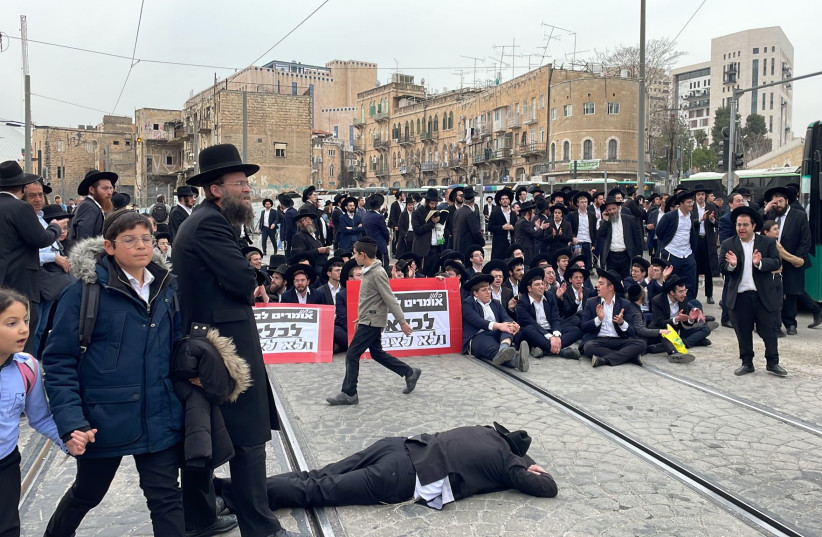Sephardi Chief Rabbi Yitzhak Yosef sparked controversy last week when, in his weekly lesson, he said that if the ultra-Orthodox were forced to draft, they would leave the country.
The backlash was swift. Minister-without-Portfolio Benny Gantz said his words were “a moral affront to the state and Israeli society,” while opposition leader Yair Lapid called them “an insult and disgrace to the IDF soldiers who risk their lives to defend the country.”
The Gaza war has brought the issue of the haredi draft to a head, as the IDF suggested last month to extend the length of service and reserve duty for soldiers. Protest organizations have been demonstrating for months, calling for equality when it comes to bearing the defense burden, and two petitions recently went before the Supreme Court on the issue of the ultra-Orthodox draft.
Before October 7, however, there was a school of thought that suggested expanding the haredi exemption based on economic research showing that such an expansion would increase haredi participation and productivity in the labor force.
In the reality of October 6, VP of data and research at the Haredi Institute of Public Affairs, economist Dr. Eitan Regev, was in favor of lowering the age of exemption from IDF service for the ultra-Orthodox, meaning those studying Torah for less time would still qualify for a full exemption from service.
“It made sense economically,” Regev told The Jerusalem Post. “Our logic as economists in the ‘days before’ was that we were talking about a sector that does not draft, and it looked like this was unlikely to change politically so that an earlier exemption would minimize the warping in the labor market,” he said.

The Haredi Institute of Public Affairs is a research organization focused on planning, implementing, and promoting data-based policies related to all aspects of haredi society in Israel.
When looking at the data without distinguishing by gender, Regev said that around 70% of ultra-Orthodox people are employed, as opposed to 85% of the general population. The real problem in the labor market is workforce productivity. The gap in workforce productivity between haredi and non-haredi workers is 90%, he said.
Lowering the exemption age would not only allow haredi men to enter the workforce earlier but may impact planning for young ultra-Orthodox people, increasing their incentive to invest in an education that would serve them in the workforce and allow them to be more productive, explained Regev.
“We can see a spike in employment for haredi men over the last two years,” said Regev, explaining that economic forces such as increasing housing costs, rising interest rates, and less help from parents who studied Torah rather than working themselves, are part of what is pushing more haredim into the workforce.
Regev said that the reality of October 8 is completely different for both the general and ultra-Orthodox population.
“Practically speaking, Israel’s defense needs have changed,” said Regev. “Ideas about a small, smart army are less relevant. We need tens of thousands of soldiers in reserves and mandatory service to hold new active fronts. On the most practical level, defense organizations such as Israel Police, Magen David Adom, ZAKA, and others need and will need more manpower.
“As the haredi part of the population grows, Israel cannot afford not to include this sector in defense organizations,” he said.
Public perception on haredi draft resistance
The public perception of why ultra-Orthodox society is resistant to the draft is that the ultra-Orthodox are concerned that drafting will interfere with Torah study, but a survey from the Haredi Institute of Public Affairs paints a different picture.
“When we talk to the haredi public, the main fear is not that joining Israel’s defense industry will harm their Torah study, but that those who join will lose their haredi identity,” said Regev, who explained that this was a significant difference, and is a problem with a different solution.
Regev explains that this challenge has solutions that do not depend on cross-sectorial wars. The solution to the fear of losing the haredi identity is to adapt defense frameworks to incorporate haredi employees and soldiers and allow them to maintain their haredi identity fully.
Another institute finding that is counter to public perception is that a narrow majority of Haredim believe that those who do not study Torah should not be eligible for an exemption from IDF service. Some 51% of the ultra-Orthodox surveyed by the institute in a poll that examined haredi opinions in the wake of the Israel-Hamas war said that those haredim who don’t study should not be exempt from IDF service. Additionally, 70% of Haredim polled said that Haredim who do not study Torah should contribute to the country through military, civil, or national service.
This is a good opening point for a real agreement that would formalize an ultra-Orthodox draft, said Regev.
“This won’t automatically cause all haredim to draft,” he explained. It allows for an agreement that would bring in an acceptable number of draftees without creating a feeling of an internal rift in Israeli society,” said Regev. He added that there is an understanding in haredi society that the post-October 7 reality is different and that the need to do their part and serve is existential.
